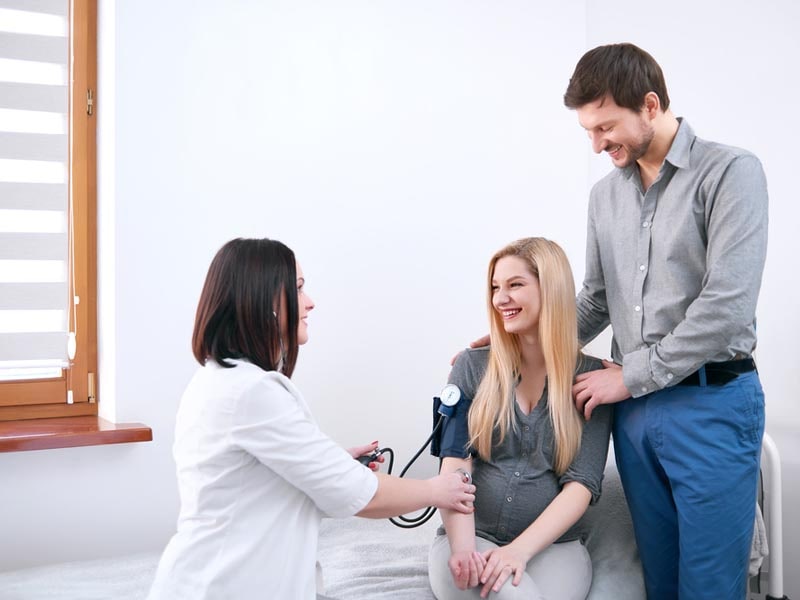Signs of Pregnancy

After fertilization in the body of a woman begins hormonal restructuring, which causes external and internal changes. With attention to health, you can learn about pregnancy even before the test. For its early detection, you should pay attention to the general state of the body. Conception affects all its systems – from sexual to digestive. Therefore, a woman learns about future motherhood by observing the symptoms that relate to each of these areas.
How pregnancy manifests itself at its initial stage: the first signs.
The first signs of pregnancy are associated with changes in progesterone concentration in the blood. This biologically active substance is produced by the ovaries.
Progesterone has the following functions:
- Prevents the occurrence of uterine contractions.
- Prepares the endometrium to attach the embryo.
- Provides a full blood supply to the uterus.
Additionally, after conception in the female body begins production of human chorionic gonadotropin – pregnancy hormone. As it is produced, various symptoms associated with general health and activity of individual organs appear. A woman learns about the forthcoming motherhood from the state of the menstrual cycle, but there are many other signs that appear before the others after conception.
Increased and more sensitive breasts
Under the influence of the produced progesterone and chorionic gonadotropin glandular tissue of the breast becomes swollen. Therefore, the woman notices that the bust becomes larger by 1-1.5 sizes. In some cases, breast pains become so pronounced that the woman refuses to wear a bra. If the discomfort in the mammary glands is an unusual symptom, you should see a gynecologist and be examined.
Appearance of bleeding secretions
Among the first signs arising in pregnant women is the release of small amounts of blood from the vagina, which indicates the successful attachment of the embryo to the uterine wall. The symptom is observed on the 7-12th day from the moment of oocyte fertilization. The appearance of the ovarian secretion refers to clinical manifestations of many gynecological pathologies. The first of them is cervical erosion, which may remain unnoticed for a long time.
Dizziness
Under the influence of hormonal imbalance changes in blood supply to the brain. Dizziness is a subjective first sign of pregnancy: the condition must be compared with diseases that are accompanied by poor blood supply to the brain. If dizziness is associated with conception, it can lead to loss of consciousness, so it is important that there are those who are able to provide first aid.
Nausea, vomiting
Each hormonal transformation is reflected in the function of the digestive tract. Therefore, already at the initial stage of pregnancy a woman notices dyspeptic disorders – nausea and vomiting. The condition is defined as toxicosis, and it should be compared with food poisoning, concussion of the brain, hypertension. These disorders are similarly manifested by attacks of nausea, passing into vomiting. In some cases, dyspepsia occurs earlier, and in others – later, that is connected with individual features of organism.
Delay of menstruation
The menstrual cycle is a mechanism adjusted by nature, and after fertilization it undergoes changes. The absence of menstruation on a familiar date indicates the new processes taking place in the body. Delay of 5-6 days – the basis for the pregnancy test and indication to visit a gynecologist. Sometimes this sign indicates a violation of ovarian function, which is preceded by starvation, stress, hypothermia. Delay of the period for 1-3 days is not considered a deviation from the norm.
Hemorrhoids
Inflammation of hemorrhoid nodes does not always occur in the 2nd and 3rd trimester of pregnancy. Since progesterone stimulates blood flow to the perineum, the area of the anal opening is also intensively supplied with blood. If before conception a woman did not have inflammation of hemorrhoid nodes, after conception, she is prone to this disease. The more intensely progesterone levels increase, the greater the risk of plexus inflammation that occurs inside the anal opening.

Frequent urination
Anatomically, the uterus is located behind the bladder. Due to hormonal changes occurring in the body after fertilization, the mucous and muscle tissue of the female childbearing organ is filled with blood, swelling, thereby increasing its cavity. Constriction of the bladder leads to more frequent calls to secrete urine. A woman can visit the toilet up to 3 times per hour.
Acne rashes
During pregnancy, the skin of the person may worsen due to rashes. In addition, the activity of sebaceous glands increases, which makes the epithelium fat and creates an unattractive shine. Skin changes are associated with hormonal imbalances. Rashes may occur even in women who did not have such dermatological problems before pregnancy. In each 3 cases, the skin condition normalizes independently during the first trimester.
Spontaneous mood changes
The increase in progesterone levels, which is observed during the initial stage of pregnancy, affects the psycho-emotional state. The primary manifestations are insomnia, irritability, apathy, predisposition to depression. As the hormonal balance stabilizes, psychological well-being normalizes.
Change of sexual desire
A woman’s libido depends on hormonal balance, which is predetermined by the concentration of progesterone and estrogen. Therefore, the fluctuations of these biologically active substances that occur after conception are reflected in sexual desire. Already in the first phase of pregnancy you can feel the appearance of sexual desire or notice its complete absence.
Increase in body temperature
The general increase in body temperature observed against the background of pregnancy is among the first signs of its occurrence. The sickness is associated with the individual characteristics of the body, and is explained by the immune response to changes. Temperature is kept on subfembral marks for a short time, and already on 2-3 weeks of pregnancy its indicators normalize. During the first trimester the increase in body temperature can be observed several times more.
Heartburn, change in taste
Hormonal fluctuations affect the taste buds, so previously favorite dishes can be disgusting. At the same time, a pregnant woman sometimes has a craving for new or unnatural remedies, or a desire to combine products that are incompatible in taste.
Sudden loss of consciousness
Along with other signs, pregnancy is manifested by lower pressure levels. Hypotension is due to hormonal changes that occur in the first hours after fertilization. Against the background of lower blood pressure, sleepiness, and even fainting may occur. But loss of consciousness is not the main, but an additional (indirect) sign, which should be considered only as one of the manifestations of the general condition.
Nasal congestion
Progesterone affects the mucous membrane of the nose, which causes its swelling and secretion. Difficult breathing and general deterioration of health are the first signs that arise from this process. Nasal congestion can be considered only as a supplement to the main signs of pregnancy. After normalization of hormonal balance, the symptom is eliminated by itself.
The first signs of pregnancy are, above all, a multi-day delay of the period, swelling of the chest, irritability and sleepiness. The rest of the symptoms occur in a different sequence and, depending on the individual characteristics of the body, may vary in intensity. The general state of health of a woman is of great importance.
